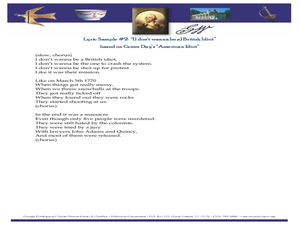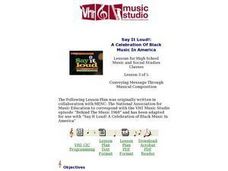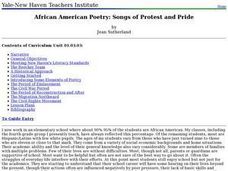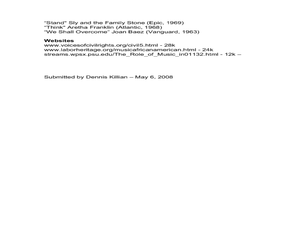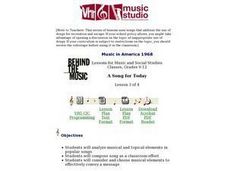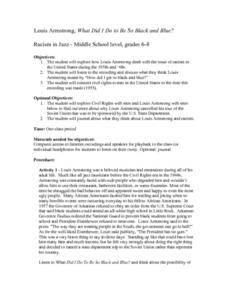PBS
Breaking the Code: Actions and Songs of Protest
Ezell Blair, Jr., David Richmond, Franklin McCain and Joseph McNeil changed history. Their sit-in at the lunch counter of the Woolworths in Greensboro, North Carolina on February 1, 1960 became a model for the nonviolent protests that...
Curated OER
25 Greatest Protest Songs - Lesson 3
High schoolers analyze the lyrics of protest songs as a catalyst for social change. They discuss the influence of music on behavior and explain the use of music as a means of self-expression.
Curated OER
American Colonists Protest Song
Students explore the role of protest songs. In this early American history lesson, students research the acts passed by the British that angered colonists. Students then listen to protest songs from contemporary American history prior to...
Curated OER
Protest Music Video
Students create an iMovie that expresses the meaning of a protest song from the 1960's or 1970's. They investigate the emotional and political overtones of the times and use images to interpret the song's meaning.
Curated OER
Protest Music Video
Students use iMovie to express the meaning and context of a protest song from the '60s or '70s. They explore different views of the protest movement and gain an understanding of the emotional and political overtones of the times.
Curated OER
25 Greatest Protest Songs
Students analyze the lyrics of protest songs as a catalyst for social change. They discuss the influence of music on behavior and explain the use of music as historical record.
National Constitution Center
Born in the U.S.A: Music as Political Protest
Though often used in shows of patriotism, Bruce Springsteen's 1985 song "Born in the U.S.A." is critical of America's role in the Vietnam war and its treatment of American veterans. High schoolers analyze the song's lyrics in an activity...
Mississippi Department of Archives and History
Protesting Violence without Violence
The ultimate legacy of Emmett Till's violent death is its role in the non-violent roots of the Civil Rights Movement. A lesson compares contemporaneous articles with the lyrics of Bob Dylan's "The Death of Emmett Till" and prompts...
Simon & Schuster
Classroom Activities for Walden and Civil Disobedience by Henry David Thoreau
An 11-page packet contains three activities designed for readers of Henry David Thoreau's Walden and Civil Disobedience. In one exercise, groups debate whether Thoreau would today be considered liberal or conservative. For another,...
Curated OER
Breaking the Code: Actions and Songs of Protest
Students listen to and discuss the purpose of protest music. They analyze an editorial cartoon related to Jim Crow and read questions from the literacy tests given to African-Americans. They work together to write a song about the...
Curated OER
"Uncle Sam's Got Himself in a Terrible Jam": Protest Music and the Vietnam War
"And it's one, two, three...what are we fighting for?" Use music to assess the climate of protest during the Vietnam War, listening to and analyzing Country Joe MacDonald's "I-Feel-Like-I'm-Fixin'-To-Die Rag" (lyrics included)....
Center for Civic Education
The Power of Nonviolence: Music Can Change the World
Here is a fantastic activity through which class members discover how music has the ability to influence others in a meaningful way. After reviewing selected pieces and modern-day protest songs, learners will research other songs that...
Prestwick House
The Poetry of Bob Dylan
Bob Dylan's selection as the 2016 winner of the Nobel Prize for Literature, the first songwriter ever to receive the honor, has focused the attention of a new generation on the work of the legendary artist. Class members...
C3 Teachers
Civil Rights: What Made Nonviolent Protest Effective during the Civil Rights Movement?
Sit-ins and boycotts, marches and speeches, songs and demonstrations were hallmarks of nonviolent protest of the civil rights movement. Young scholars research primary and secondary source documents to determine what made nonviolent...
Curated OER
Conveying Message Through Musical Composition
Students listen to and discuss various protest songs from the 1960's, and write original lyrics for a song addressing global or societal issues. They write a paragraph evaluating the efficacy of the song to convey a message.
Curated OER
African American Poetry: Songs of Protest and Pride
Students are introduced to various time periods in history in which African Americans wrote songs and poetry to cope. In groups, they travel between different stations to listen or read poems and music from the Civil War period, Civil...
Curated OER
Understanding the Music of the Civil Rights Movement
Students examine protest music and songs from the Civil Rights movement. In this music of the Civil Rights era lesson, students listen to selected music before working in groups to determine who the music was directed at, what social...
Curated OER
A Song for Today - Lesson 3
High schoolers analyze musical and topical elements in popular songs and compose song as a classroom effort. They write a short paragraph evaluating the effectiveness of the song in conveying the message of the lyrics.
DC Vote
One Kid, One Vote
Learn about why the citizens of Washington, D.C. feel unrepresented in Congress with an article about D.C voting rights. Individuals read about the movement toward congressional representation in Washington, D.C., before...
VH1
Lessons for Hight School Music Classes: Lesson 2
Art and music have been vehicles for statements of civil unrest for hundreds of years. Upper graders critically analyze several pop songs or music movements from the 1980s that exemplify politically charged motives. They...
Curated OER
The Effects of Slavery
The emotional and spiritual oppression of slavery in the African-American experience is the focus of this lesson. Middle schoolers analyze various texts by Frederick Douglass and Maya Angelou related to freedom and oppression....
Curated OER
Focus of Native American Religious Practices
Here are five quick lessons you can use to introduce your class to religions from around the world. They view and perform a Native American dance, watch a video on Judaism, compare the difference between Catholics and Protestants, watch...
Curated OER
Racism in Jazz
Students listen to the Louis Armstrong song, "What Did I Do to Be So Black and Blue?" and consider it as a protest song. They write in their journals about Armstrong, his music, and civil rights.
Curated OER
Songs of Unrest - Lesson 4
Students identify popular songs from 1968 and make connections with the year's current events. They pretend that they are producing a new CD. The CD includes four songs that comment on today's social issues. They write the liner notes.




